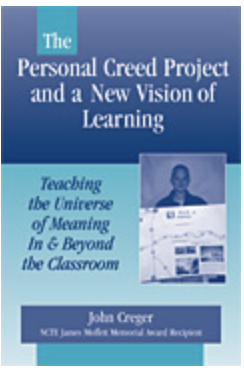Language Arts
TEACH YOUR STUDENTS TO FIND THEMSELVES
Course No. ED471w, ED571w
Social and emotional learning has gained attention in schools around the country. But while the purpose of SEL is praiseworthy, can pre-packaged programs realistically do all they promise? Do teachers and students really need more externally created curriculum and standards to measure and be measured for? Do schools really need more flashpoints in our culture wars?
This course focuses on the first foundation stone of student development: their discovery of themselves. Rather than rely on one-size-fits-all commercial products, in this course you learn to design ongoing strands of curriculum and instructional methods to help your own students and those of your colleagues build self-knowledge alongside their academic development.
In this course you join your students as they develop the habit of reflection. Working with the Personal Creed Project, students and teachers come to understand who and what have shaped them. According to the capacities of their developmental stages, they begin discovering and committing to their values, and learning to stand for something in the world. Adapted in schools and colleges around the country, the Personal Creed experience points to new course design and instruction practices that generate enthusiasm, self-knowledge, and the desire to contribute, while deepening academic committment and skills. In this course you learn these practices. This makes for unusually rewarding teaching.
In my classroom alone over the years, more than four thousand students have presented their personal creeds to their class communities. One wrote:
What I realized from my Creed Project was that every person on this planet has problems they face, whether it is Jeff Bezos or a homeless person on the streets. You must be able to keep an open mind and realize this without being selfish. Thus, I believe that the Creed Project is the best project I have done so far and was worth all the time and effort I put into it. It was the break from education that I desperately needed and gave me a lot of ideas about who I am and what defines me. ~ Aaron Li, class of 2024
Enthusiasm for the Personal Creed Project among students has always been high, but this past year it peaked. A group of former students invited me to join them in forming The Personal Creed Organization. Our first venture as a team has been to create an online course version of the Creed Project on the Udemy platform. You can now use this more efficient version with your students in Assignment #7 of this course. Our second project is to create an online community to promote and support self-discovery. You'll be invited to use our community in your own self-discovery.
A member of the first group of teachers to take this course as a team wrote on completion:
What came from this course was a restructuring of education as a whole... I learned that self-reflection and value evaluation are key pieces in crafting well-rounded children. ~ Kylinn Irwin, Central Elementary, La Grande OR, Spring 2021
This course is well-suited for individual teachers and especially rewarding to take as a team of school site colleagues. I'd love to work with you and/or your team!
Course text, used on Amazon: $20-30.
NOTE (5/25/24): Since the price for my book on Amazon has recently doubled, please email me and I'll mail you a copy for the price indicated ($25): jcreger01@gmail.com. Thank you!
Find out more on John's website.
| We advise you to review and download the course syllabus before registering. | Syllabus |
- Understand the developmental needs of your students, and how to nourish those needs;
- Engage your students with activities and projects to facilitate their developmental-stage need to build healthy senses of identity;
- Become familiar with research on how to cultivate an engaged mindset in learning;
- Use teaching and design strategies to help students gain the self-knowledge they need to navigate a healthy transition into adulthood;
- Learn to facilitate a community rite of passage in the classroom or online in which students reveal the influences that have shaped them, the values they have discovered, and the difference they wish to make as individuals and citizens in the world;
- Consider adapting the Personal Creed Project to fit your own teaching situation;
- Discover that teaching students to reflect on their lives is a powerful way to catalyze their engagement in writing;
- Begin designing a developmental arc of curriculum to balance your students’ academic progress with self-discovery.


